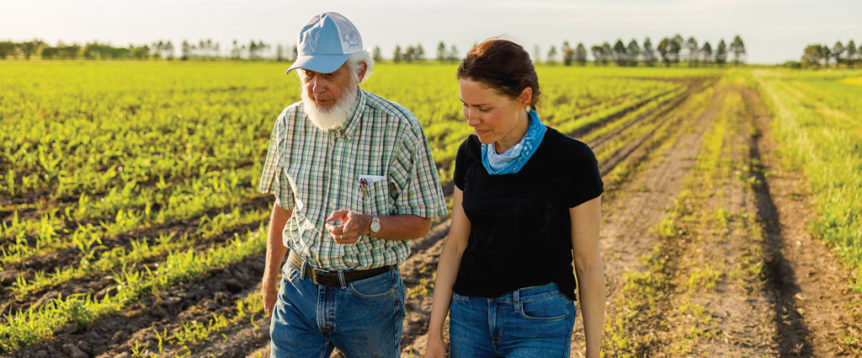We don’t always think of clergy in the same vein as farmers. But if you were to take a close look at the farming practices David Vetter uses on his 274-acre Nebraska farm, The Grain Place, it may come as no surprise that after attaining a degree in agriculture he attended seminary school.
Vetter is known to nurture his land and soil as if they were living beings, using regenerative organic practices, which means he farms without chemicals and with an understanding of the interconnectedness of soil health, biodiversity, wildlife, and animal and human welfare. Because he is mindful of both the health of his employees and the role healthy food plays in supporting human health, it’s no surprise that companies such as Quinn Snacks, among others, rely on his crops for their products.
“You can’t produce healthy food on unhealthy soil. Unhealthy food doesn’t do much to develop healthy people. Healthy soil equals healthy food, which equals healthy people,” he explains.
Reverence for the farm’s land started with Vetter’s father, who attended the University of Nebraska’s agriculture college and took soil-health-related courses before going into military service in 1941 during World War II. After the war, numerous courses promoted repurposing wartime chemicals for agriculture. At first, Vetter’s dad jumped on that bandwagon, but his observations over the following years led him to believe there had to be a better way, and he quit using chemicals altogether.
When Vetter returned after college and seminary, his goal was to improve upon what his dad had started, boosting the farm’s soil and overall health. In 1978, The Grain Place became certified organic. But if the farm was Vetter’s church, there was no real congregation, because the family’s community and other local farmers all but abandoned them, not sure what to make of their nonchemical practices. As noted in the recently released documentary, Dreaming of a Vetter World, a local headline once read: “Successful organic farmer no longer considered ‘crazy.’” Although the separation still existed between organic and nonorganic farmers, with time it became clear that the Vetter farm was actually performing as well as or better than its conventional neighbors.
Success without the use of chemicals takes time, knowledge and patience—perhaps even faith. Vetter’s success depended on farming multiple crops at once as opposed to using the common practice of mono-cropping, growing just corn or soybeans, for instance. The farm uses cover crops to promote healthy soil and water retention, practices referred to as regenerative. Crops are divided into 18 fields and harvested in nine-year rotations. “What we do takes more time; we see results in terms of the healthy farm and ecosystem. The drivers of getting there are complexity and diversity,” Vetter says.
And with time, Vetter has grown his congregation. He added grain cleaning and storage facilities to the farm, known as Grain Place Foods, to serve other small-scale organic farmers in the region, as well as specialty-food distributors and processors. Now, he is seeing both a growing demand for organic and an increasing number of nearby farms converting to organic. The latter is important, because chemicals used on neighboring farms, he says, impose a constant challenge to being able to put out a good product. Yet, knowing that the organic market will continue to take time to grow, Vetter is encouraged. And when he’s not, that’s where his faith carries him through.

